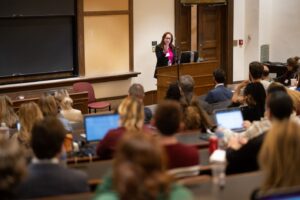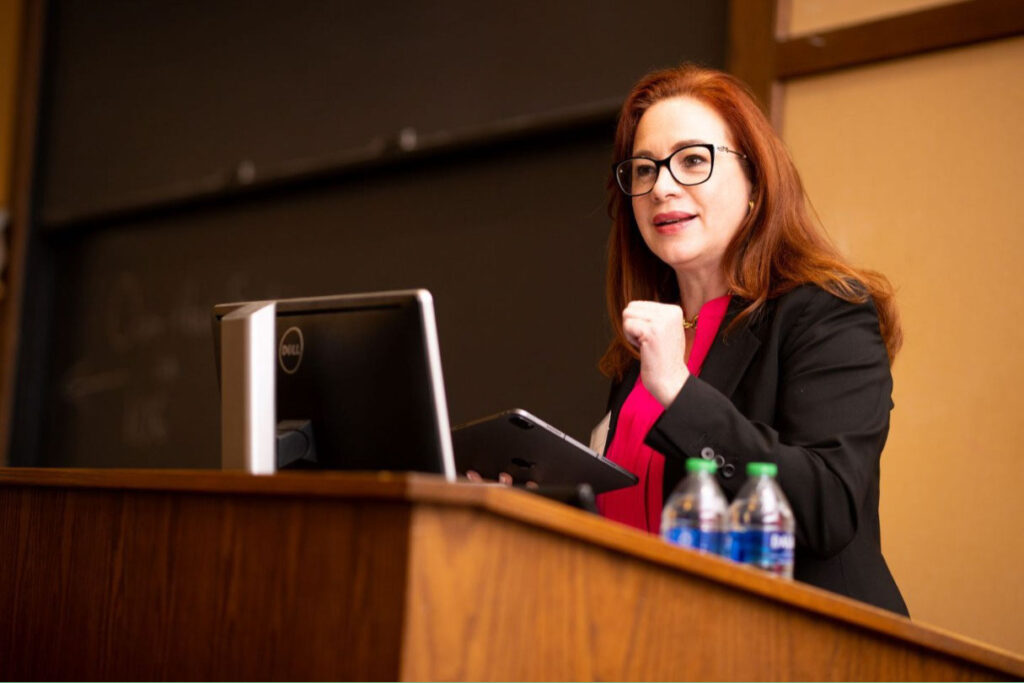World affairs need young changemakers, former UN official says
By Bryan Hay
Young, creative, and energetic changemakers have a shared responsibility to address multiple global crises and take risks to reimagine world affairs, Maria Fernanda Espinosa Garcés, former president of the United Nations General Assembly, told a Lafayette College audience on March 28.
Delivering the 10th Robert ’69 and Margaret Pastor Lecture in International Affairs before a capacity audience of faculty, students, and staff in Kirby Hall of Civil Rights auditorium, Garcés said the power of youthful energy to effect change is real and reflected in her own career.
She described how she started working at a nonprofit in her mid-20s to save the rainforest and help Indigenous peoples in her native Ecuador. After serving in academia and as Ecuador’s Minister of Foreign Affairs and Minister of the Environment, Garcés was seated at the main podium at the U.N. in 2018, becoming the first Latina to lead the General Assembly and only the fourth woman in the history of the world body to hold that position.
“I am a strong believer in the transformational power of younger generations,” she said. “I have the privilege to be here with you, and in a time of great turmoil, of great uncertainty.”
Multiple and compounded crises exacerbated by the pandemic and the war in Ukraine include global poverty, climate emergencies connected to water quality and availability, and transactional inequalities related to gender, race, income, and power, Garcés noted
“These are all symptoms of a more profound and systemic civilizational breakdown,” she added. “There is a need for your energy, your intelligence, your engagement with world affairs.”

Maria Fernanda Espinosa Garcés, former president of the United Nations General Assembly, delivers 10th Pastor Lecture.
The highest price for these breakdowns is always paid by the most vulnerable—children, Indigenous peoples, migrants, refugees, and persons with disabilities, said Garcés, noting that women, who make up half of the globe’s population, are not minorities yet suffer from gender-based violence, discrimination, and inequalities while not sharing a balance of power with men, who hold most of the seats in world governments.
“A woman in sub-Saharan Africa has around 130 times higher risk of dying from causes related to pregnancy or childbirth than women in Europe or North America,” she said, noting that more than 50 million women and girls live in countries that do not have a single female minister in government.
What the world needs is a new social contract, a recommitment to the basic principles of the U.N.’s founding charter, Garcés said.
“It is about cooperation. It is about solidarity. It is about peaceful coexistence, the respect for human rights,” she said, adding in her own wishes for freedom to live in harmony with nature.
Someone visiting Earth from Mars would be confounded by the way the human species fails to exercise the basic principles of self-preservation, she said. The paradox is that while humans are in the midst of a sophisticated, prolific technological revolution, they cannot apply those resources for self-preservation, Garcés said.
“There is a great difficulty in bringing together the political, the economic, the cultural dimensions of decision-making and problem-solving, and identify, clearly, what is holding us back,” she said.
There are two options—paralysis and despair or resolve to act and use the global crises as an opportunity, “a lever of change,” Garcés added.
“It’s easy to say and difficult to do. I’m not naïve,” she said. “What I have learned, after so many years of multilateral work, is that no country, regardless of its military, technological, territorial demographic, or economic power, can face these multiple crises on its own.”
Delegates to the U.N. may come from different backgrounds but all want the same things out of life, including access to a good education and health care, a clean environment, and “the freedom and the opportunities to be who we want to be,” Garcés said.
The U.N.’s 2030 agenda, a plan of action for people, planet, prosperity, and peace outlined through 17 sustainable development goals and related targets, will require the energy of youth to achieve, she said, noting that by 2030, half of the world’s population will be under age 30.

Maria Fernanda Espinosa Garcés, former president of the United Nations General Assembly
“It’s a great opportunity that you’re going to be the majority with a tremendous power,” Garcés said directly to students in the audience. “Your generation is highly educated and creative. You are willing to take risks to challenge received wisdom. You were born as global citizens. You understand better than some policymakers that the problems we face cannot be sold by one government or indeed by governments alone.
“My experience has been that you are instinctively multilateral,” Garcés said. “We cannot afford to exclude you from decision-making. We cannot afford not to have you as our partners on the ground, making the changes that are needed. It starts by imagining the future we want, the future we deserve, and you have the power to make it all happen.”
She ended her remarks by quoting lyrics from Leonard Cohen’s “Anthem”:
Ring the bells that still can ring
Forget your perfect offering
There is a crack, a crack in everything
That’s how the light gets in
Angelika von Wahl, John L. ’67 and Jean A. Hatfield Professor of International Affairs and program chair, welcomed Garcés, whose talk was animated by her participation last week at the Global Futures Forum at the U.N. Before her evening appearance, Garcés met with classes and student groups for several hours, an experience described by Von Wahl as “very impactful.”
Garcés has written more than 30 academic articles about the Amazon region, culture, heritage, sustainable development, climate change, intellectual property, foreign policy, regional integration, and defense and security.
The Robert ’69 and Margaret Pastor Lecture Series was launched in April 2013 with a visit and talk by former President Jimmy Carter. Pastor ’69 (1947-2014), for whom the lecture series was named, served the Carter administration as security adviser for Latin America and the Caribbean, and worked to ratify the 1977 Panama Canal treaties. Members of the Pastor family attended Garcés’ lecture virtually. Since its start, the lecture series has brought respected political scientists, diplomats, and writers to Lafayette.
Learn more about the Robert ’69 and Margaret Pastor Lecture Series.

